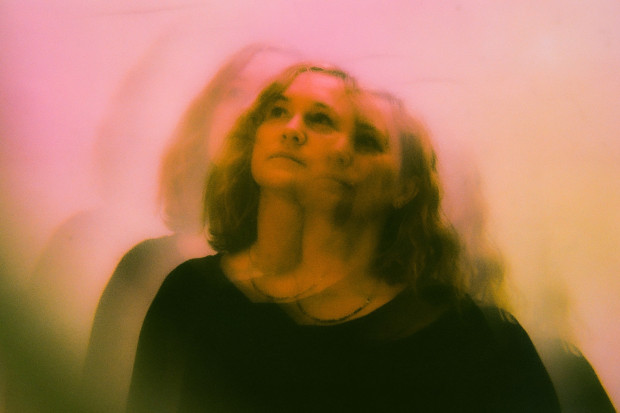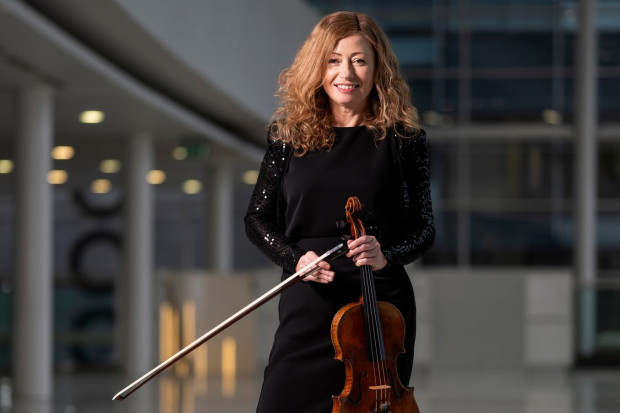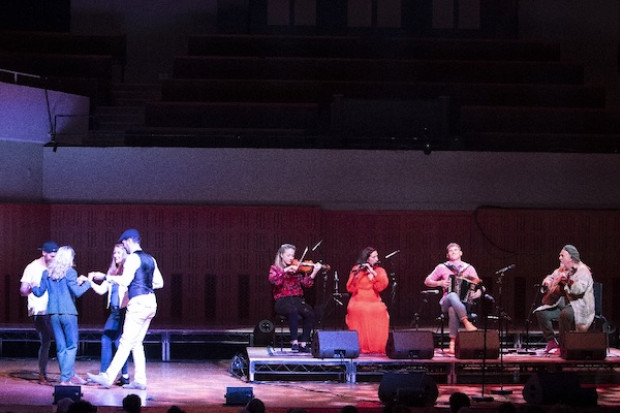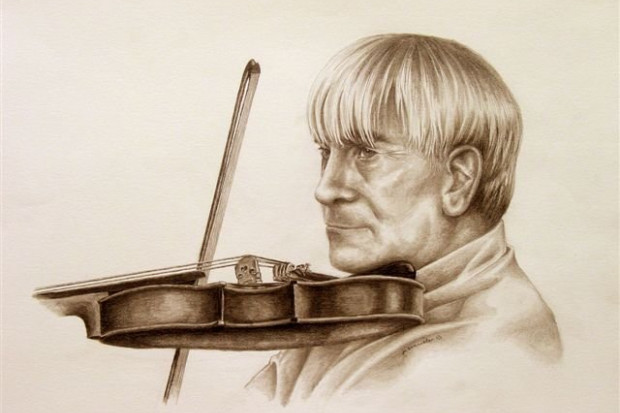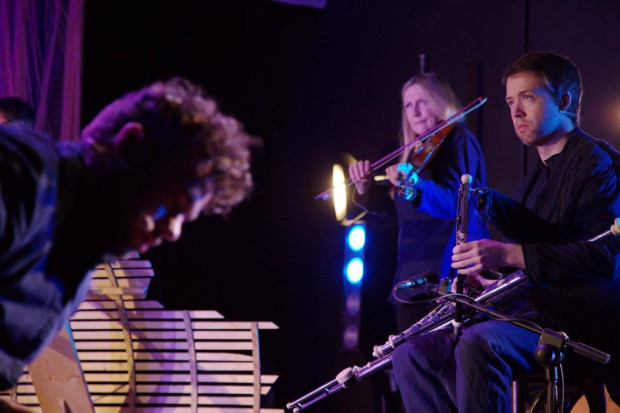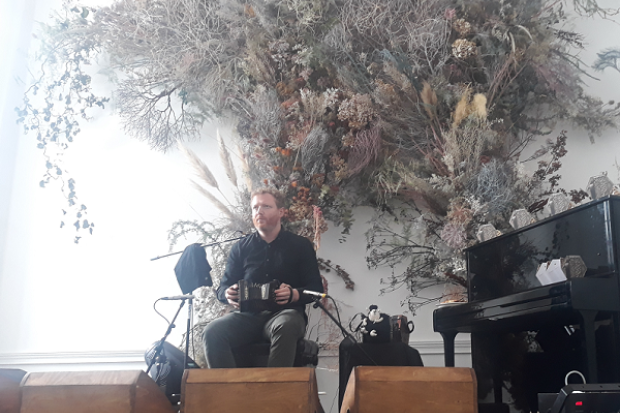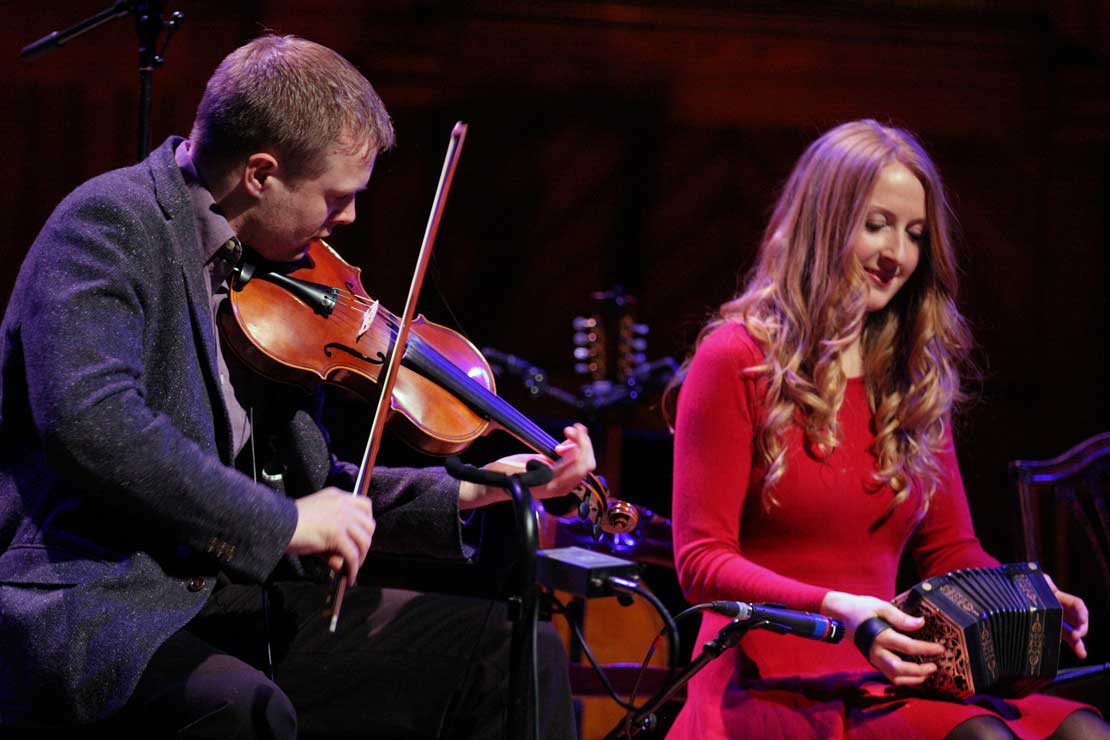
Ciarán Ó Maonaigh and Caitlín Nic Gabhann, who performed at the Feakle traditional music festival.
The Freedom of Feakle
The Feakle Festival, a village gathering of Irish traditional music with an international reputation, is now in its thirty-second year. I attended the Friday and Saturday of the event (9–10 August), the central days of a festival that actually goes on for almost a week.
The whole of Feakle vibrates with music during the festival. There are official events, to be sure: two evening concerts that we will turn to in a moment, official sessions in all five of the village’s pubs, and sundry supporting events: céilís and céilí classes, poetry readings, performance masterclasses, talks, children’s events, and even a trad disco. But the festival’s programme actually undersold how music was lambent throughout: every doorway seemed to have a table around which three or four old friends had taken out their instruments (everyone seemed to be a musician) for an impromptu session. Even the sold-out concerts didn’t put a break in the music happening elsewhere.
I will not say more about this ambience though: the sessions were good, but it was in the concerts that interesting and unexpected things happened.
Fizzing and simmering
Proceedings at Friday’s recital, in St Mary’s Church, were opened by Garadice, a group of established musicians who released their debut album last year. And they opened strong, with a fine rendition of ‘A Sligo Air’ by Padraig McGovern (uilleann pipes) and John McCartin (guitar) leading nicely to ‘Gladstone’s Bill’ when they were joined by Dave Sheridan on flute. After some excellent banter, Eleanor Shanley’s famous voice joined the ensemble for a rendition of ‘Motherland.’
The set proceeded in this manner: well-played dance tunes interspersed with songs, glued together by excellent stage presence. I confess that I thought there was not enough attentiveness to the arrangements: not much consideration was given to the tunes’ internal logic or narrative, and the harmonies were mostly quite orthodox. The singing was a little sweet for my taste, but judging by the audience’s response, my reservations were not widely shared.
Next to perform were Caitlín Nic Gabhann (concertina) and Ciarán Ó Maonaigh (fiddle), acclaimed musicians in their own rights who have been playing together for some years now (they released an album, Caitlín & Ciarán, in 2015, and another, The High Seas, with Cathal Ó Curráin, in 2018). It was an instructive contrast to Garadice. Despite their limited instrumental palette, Nic Gabhann and Ó Maonaigh managed to build a more energetic and colourful set. There was a compelling simmering energy in the set of reels that opened, ‘The Leeside Sessions’, and Ó Maonaigh’s use of drone in ‘The Japanese Hornpipe’ was a lovely touch. Subtle beauties of this sort were abundant, but the highlight was surely Nic Gabhann’s step dancing: not just because her dancing was joyful and free, nor because of the fizzing rhythmicality of Ó Maonaigh’s accompaniment, but because of the strength of the partnership.
Totally unprepared
The main act of the evening, the Martin Hayes Quartet, took place after the interval. I had high expectations here: not only is Martin Hayes one of the most respected living traditional musicians, but I saw the release concert of their debut The Blue Room in 2017, and thought it extraordinary. So I was looking forward to the quartet’s performance tonight. It turned out that I was totally unprepared.
Hayes is a Feakle native who has performed at the festival for the last twenty-seven years, but his quartet (Hayes, Doug Wieselman, bass clarinet; Liz Knowles, hardanger d’amore; and Dennis Cahill, guitar) opened this set with a surprising artistic distance: they launched without a word of introduction into ‘Easter Snow’ played with Hayes’ inimitable sense of the rise and fall of the breath and heartbeat of the tune; already my own breath was taken from me, but the quartet moved without respite to another tune (‘My Mind Will Never Be Easy’) played with the same gentle intensity, and then to another, and another – the first set was eventually six tunes long, sensitively arranged and shaped, leading into one another with an increase in intensity so slow and organic as to be almost imperceptible, each tune complementing the previous and completed by the next, until, after twenty minutes or so, with all players in full voice, Hayes’ melody soaring and swooping through the church for the climactic reel, ferocious while yet being warm and gentle, I thought my heart would burst in me.
We erupted into enormous applause.
When Hayes finally spoke, his first words were to give thanks to his collaborators, the previous performers, the organisers, the hosts, and the audience. The second half of the set was, fortunately, not so exhausting: not that there was ever a moment in which every player was not playing with the most extraordinary grace (and so mentioning ‘highlights’ would be absurd), but at least we got to rest every tune or two.
After the final tune (‘Brennan’s Reel’), the audience rose as one in another standing ovation. We got our encore, and though I thought the first tune in the encore set (‘The Groves’) was an incongruous choice (the only weak moment in the set), it was nevertheless brought by a fine segue to Tommy Peoples’ reel which in turn by a fantastic false ending led to a final reel which again brought the entire audience to their feet.
The Martin Hayes Quartet’s gig was transporting from first note to last; it was not only a highlight of the festival, but frankly one of the best concerts of any musical genre I have ever attended, and one could write an essay on it alone (and I might yet). Suffice to say for now that we went home nourished.
Showcases
The Saturday evening gala concert, in the Feakle Community Hall, was a more subdued affair, at least in the beginning, than the Friday recital. The first of its four sets was led by Éilís Crean (fiddle) with John Regan (accordion) and John Mock (guitar) supporting. The set was a showcase of the compositions of Crean’s East-Galway-style teacher Eddie Kelly, on whom Crean has also just published a book. The playing was good (though the intonation was not always great), but I was left with the impression that I had attended a history class rather than a concert: with the exception of one or two tunes, in particular ‘Down the Strand,’ the music did not particularly come to life.
This was followed by a set by four teenage musicians: sisters Lily and Eve O’Connor (concertina/harp and fiddle), Caoilte Morrison (flute), and Macdara Ó Faoláin (bouzouki). These were by some margin the youngest players of the festival. Their group tunes were all well played, but they particularly shone as solo players: Eve O’Connor’s playing was wonderfully light, Morrison and Ó Faoláin’s set of reels had great energy and individuality, and Lily O’Connor’s performance of ‘Aghaidh Jhanuis’ from Michael Rooney’s Millennium Suite was delicate and heartfelt.
This was followed by Catherine McEvoy (flute), Mícheál Ó Raghallaigh (concertina) and Jack Talty (stage piano). These are all established and fine players, but as with Crean’s set, the music did not really take off, and lacked chemistry. I thought I was perhaps tiring. (As an aside, the tone of the stage piano through its guitar amp was about as insipid as you might expect, and I do wish traditional musicians – Garadice also used the same instrument – would stop thinking that this is any substitute for an actual piano.)
Polka weather
At this point, the evening was beginning to wear on, and when the concertina player Cormac Begley came on stage for his set to polite applause to tell us that he did not deal well with the weather (it had been raining constantly all day), we knew exactly how he felt. ‘What is good for this frustrating weather,’ he continued, ‘is a polka’—and within two bars we found ourselves somewhere altogether more invigorating. By the end of the first pair of polkas, Begley was panting, his partner, the fabulous Steve Cooney, had broken a guitar string, and the audience was wide awake. The rest of the set travelled widely: from slow airs to reels, from solo concertina to solo guitar to even a bit of ‘Irish traditional didgeridoo’ (a length of drain pipe). It was unified by the fire that both Begley and Cooney brought to everything: a demonic drive to the fast tunes, a tortured pathos to the slow tunes. Begley played with huge and sudden shifts of dynamic and with powerful use of swelling chords, and Cooney was able to switch from thunderous chordal accompaniment to the most tender fingerstyle solo playing. Begley also coaxed some wonderful ‘quare sounds’ – huffs, puffs, slaps and farts – out of his concertinas, but always in a way entirely in keeping with the energy of the music being played. He had experimented a little with these extended techniques in his superb eponymous 2017 debut album, but his utilisation of them this night was freer and more playful, while also being more aesthetically coherent.
Begley and Cooney’s set ended with a pair of reels accompanied by two set dancers, Irene and Ashline Cunningham; these two had also joined McEvoy, Ó Raghallaigh and Talty for the last tunes of their set, but accompanied by Begley and Cooney, their dancing had a naturalness and power missing before. When they finished, the audience rose hollering for the third standing ovation of the festival, and we stayed applauding until an exhausted and sweaty Begley and Cooney returned a few minutes later for two fantastic encores.
In my opinion, Begley’s debut album marked him as one of the freshest and truest voices in Irish traditional music, but on the evidence of this set, he has only grown, in courage and expansiveness. Cooney, for his part, proved himself not only a superb showman, but one possessed of immense musicality and melodic tenderness too. We didn’t even feel the rain when we left.
The future
The Feakle festival is a strange between-worlds affair. On the one hand, it is a local village event attended by the same good friends who have been at every iteration for twenty or thirty years, and who quite reasonably programme for each other. On the other hand, it is an important festival that attracts deeply committed fans and players from Japan to the USA. This year, both worlds co-existed and the festival was at capacity (as ever), but, especially in the Saturday concert, there was a complacency about it too, and here I thought I smelt a distant but approaching danger. It’s a challenge that faces many small traditional Irish music festivals: Is their programming constantly pushing forward? How can they balance conservation and celebration of traditional practices with the diversity in music today? Are they engaging with new communities in Ireland? And do they have the resources to change with the times if they need to? What, in short, is their future in ten or fifteen years?
As something of an outsider to the tradition, I know how I would answer these questions: I got most out of Hayes’ and Begley’s takes on the tradition, and I was a bit surprised by the narrowness of the demographics. But this is me; in the end, these questions are for the Feakle festival, and if Feakle answers differently to other festivals, this can only strengthen Irish music.
But I do not want to end on this note of warning: this year, the festival had seven acts in its reasonably priced evening concerts; of these, two were superb, and a third was one of the best gigs I have ever attended. With a hit-rate like this, the organisers should be immensely proud.
Visit www.feaklefestival.ie.
Published on 15 August 2019
James Camien McGuiggan studied music in Maynooth University and has a PhD in the philosophy of art from the University of Southampton. He is currently an independent scholar.












